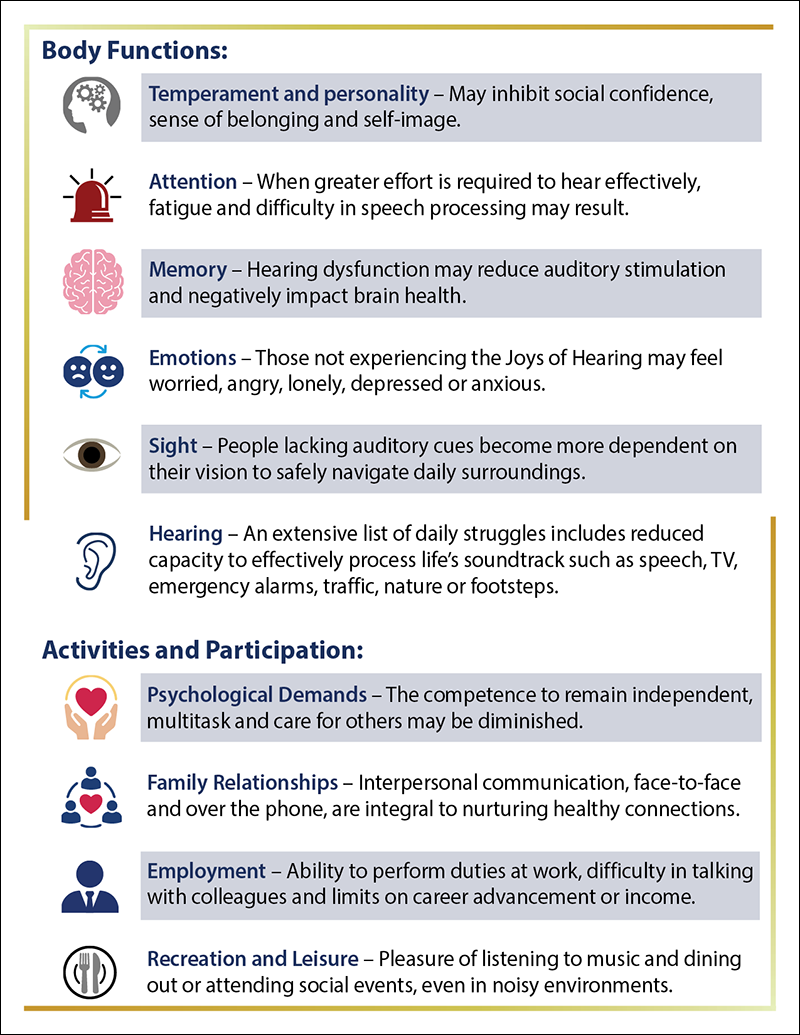With Mother Nature awakened from her slumber, Spring’s sights and sounds are in full bloom. When our senses are heightened about seasons changing, it is an ideal time to plant self-care seeds with respect to May being Speech-Language-Hearing Month.
With Medical Model intentions, our Educational E-Newsletters consistently explain how decades of extensive research indicate that:
“Hearing loss is the fourth-leading cause of disability globally and is associated with social isolation, depression, cognitive decline, and other negative health outcomes.” 1,2,3,4
Aligned with Speech-Language-Hearing Month’s awareness mission, we examine essential research regarding many aspects of how hearing loss may affect activities of daily living and overall health. Case in point, a dedicated group of authors reviewed 2,779 unique medical journal publications on this subject, then selected 45 studies for in-depth analysis.
Their learned cornerstone is this key term/phrase:
Their research findings detail categorized ICF subsets and how hearing loss may impact HRQoL (Health Related Quality of Life) of each. This curated list provides a crucial snapshot of auditory connections:
In the category of…
While advanced hearing devices are often the platform, our tailored solutions are the method. With noisy environments and challenging listening situations in real-world settings, our specialized ability to guide patients in navigating them is essential. Just as precise testing equipment enables evidence-based diagnostics, our keen understanding of lifestyle needs ensures you get maximum benefit from technological features such as artificial intelligence and direct connectivity to mobile phones or home entertainment devices.
For all these reasons and SO many more, Don’t Wait Years to Take Care of Your
Ears.
With a deep sense of purpose, all year round, our compassionate team wants you to
be Happy to Hear in many settings.
May we see you soon?
1 GBD 2015 Disease and Injury Incidence and Prevalence Collaborators. Global, regional, and national incidence, prevalence, and years lived with disability for 310 diseases and injuries, 1990-2015: a systematic analysis for the Global Burden of Disease Study 2015. Lancet. 2016;388(10053): 1545-1602. doi:10.1016/S0140-6736(16)31678-6
2 Mick P, Kawachi I, Lin FR. The association between hearing loss and social isolation in older adults. Otolaryngol Head Neck Surg. 2014;150(3): 378-384. doi:10.1177/0194599813518021
3 Li C-M, Zhang X, Hoffman HJ, Cotch MF, Themann CL, Wilson MR. Hearing impairment associated with depression in US adults, National Health and Nutrition Examination Survey 2005-2010. JAMA Otolaryngol Head Neck Surg. 2014;140(4): 293-302. doi:10.1001/jamaoto.2014.42
4 Lin FR, Ferrucci L, Metter EJ, An Y, Zonderman AB, Resnick SM. Hearing loss and cognition in the Baltimore Longitudinal Study of Aging. Neuropsychology. 2011;25(6):763-770. doi:10.1037/a0024238

